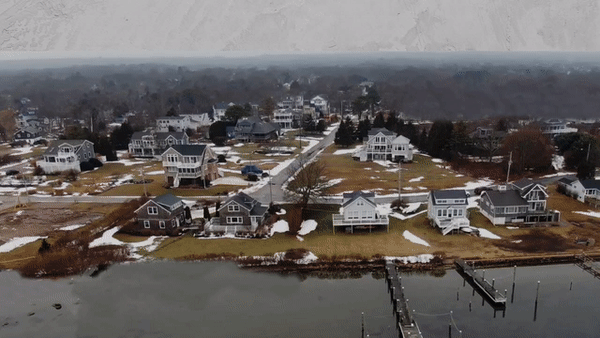UPDATED: But many Charlestown shoreline owners don’t give a crap
By
Will Collette
 |
| Joanna Detz/ecoRI News |
According
to the First Street Foundation that specializes
in monitoring flood risk, Charlestown has the greatest proportion of properties
at risk of flooding in Rhode Island.
Even
though there is federal financial support available to raise their homes up and
(hopefully) above storm surge, only 38% of eligible homeowners have taken the
initial step, the design phase. That’s 17 of a total of 45 eligible properties.
Under the federal program, the feds will pay 65% of the cost of raising a house
above the danger level.
As
Superstorm Sandy proved in 2012, a major storm will cause catastrophic damage.
Such storms will become more frequent, plus sea level will continue to rise.
Channel 12 estimated that, depending on the size of the house, the cost share under the federal program to the homeowner would be between $45,000 and $89,000.
Since
so many of these properties are valued at $1 million or more, sometimes a lot
more, and there are insurance savings to be had, the lack of participation is
baffling.
Our
Zoning Officer Joe Warner told Channel 12 “It’s certainly
intriguing that we didn’t have more interest because that’s a pretty big
percentage [65%] to be paid for.”
Charlestown
is not alone when it comes to apathy to flooding from climate change,
especially among the wealthy. A recent Georgia State
University study of coastal home buying in Florida showed there
was almost no effect on home buying in flood-threatened areas even though
sellers are required to disclose the risk.
Part
of the problem is that mortgage lenders and many appraisers were not including
flood damage potential in their determinations of home value even though flood
insurance sellers were. But wealthy buyers who pay cash aren’t
required to purchase flood insurance.
They may be sanguine about storm damage, thinking
they can afford to simply repair or rebuild. Maybe they can do that in Florida
but under
Rhode Island CRMC rules, if a coastal property suffers 50% or more damage from
a storm, the property may not be rebuilt.
The
WPRI report quotes CRMC spokesperson Laura
Dwyer who cites this CRMC regulation:
“…all residential and non-water dependent recreational, commercial, and industrial structures on undeveloped barriers physically destroyed fifty percent (50%) or more by storm induced flooding, wave or wind damage may not be reconstructed regardless of the insurance coverage carried.”
Joe
Warner, for his part, has done everything he can to help coastal homeowners.
He’s taken courses, won certifications and taken measures to secure the highest
rating from FEMA for Charlestown’s emergency preparedness. Joe’s efforts have
substantially cut the insurance cost for these properties.
But
property owners’ failure to elevate their structures might affect that rating
as the climate crisis worsens.
Joe
also noted that the federal assistance program only covers a small fraction of
endangered properties:
“[The Army Corps of Engineers] only came up with 45 properties and we have hundreds, if not thousands that are potentially in harm’s way.”
If
anyone in town would know this, it’s Joe. But his estimate has some back up from the First Street
Foundation who say:
“There are 500 properties in Charlestown that have a greater than a 26% of being severely affected by flooding over the next 30 years. This represents 23% of all properties in the city.”
There
is a strong political dimension to this problem. The Charlestown Citizens
Alliance (CCA) counts on wealthy shoreline residents as its core support for
campaign funding. Those shoreline properties are also a big part of
Charlestown’s tax base.
For
those reasons, the CCA and the town have a pretty strong self-interest to keep
those properties from being blown and washed away in the next inevitable major
storm.
 |
| A NASA satellite, Sentinel 6, is constantly measuring sea levels, the newest of several satellites providing critical data about the climate crisis. This animation shows the radar pulse from the Sentinel-6 Michael Freilich satellite’s altimeter bouncing off the sea surface in order to measure the height of the ocean. Credit: NASA/JPL-Caltech |
Hopefully,
they’ll get that fixed quickly.
This
Commission has the following mission:
Study and analyze issues and impacts of climate change and global warming, development of strategies, policies and plans for mitigation of and adaptation to impacts from climate change and global warming.
There
are a veritable legion of scientists and experts already studying the effects
of the climate crisis on the New England coastline and we already know what is
most likely going to happen to Charlestown.
For
example, there is a newly released National Oceanic and Atmospheric
Administration’s 2022 Sea Level Rise
Technical Report. Frank
Carini at EcoRI writes about this report HERE.
This
Commission may have some talented people on it, but I hope they are smart
enough not to waste time duplicating the efforts of federal, state, university,
non-profit and businesses who have already done the science.
 |
| Illegal in Charlestown |
I
hope this Commission will also recommend that Charlestown puts more effort into
reducing carbon emissions and increasing the use of green energy. Better late than never.
 |
| New wind wall: Illegal in Charlestown |
Charlestown
should restart its Solarize
Charlestown
program and also launch other group-buying efforts to help property owners make
the switch to green energy. Solarize Charlestown was the only town effort to
promote the switch to green energy but it only lasted a few months in 2017 and
less than 40 households participated (mine was one of them – best decision we
made).
 |
| We had these panels installed under Solarize Charlestown in Nov. 2017. Since then, they have saved us thousands in lower electric bills and rebate checks from National Grid, (Photo by Will Collette) |
These
measures are in line with global and national efforts to try to slow down the
climate crisis but it’s not going to stop the storms.
I
have raised concerns
in the past
that perhaps one of the driving forces behind the Budget Commission and CCA
effort to raise taxes so we can build up a huge budget surplus to use as a bail-out
fund for Charlestown’s beach property owners.
 |
| Chair of Charlestown Budget Commission, explaining $3 million "oopsie" |
As
we all discovered in January, the Charlestown Budget Commission accidentally spent
$3 million it thought it had in unassigned surplus funds because of an “oopsie”
that assigned those $3 million to another purpose.
I
am concerned the CCA and the Budget Commission will use the new Climate
Resiliency Commission to provide political cover so they can raise taxes in
the budget due to go into effect July 1 (assuming voter approval) to rebuild
the surplus money pool.
What the Climate Resiliency Commission can actually do to guide Charlestown through the climate crisis remains to be seen though I do wish them luck.
